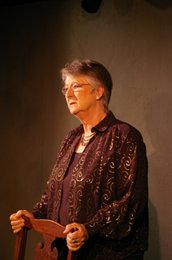She was a dancer to the very core of her being. It was the thing by which she defined herself. And why would it be otherwise? For it was dance that saved her from the gas chambers, rescued her from scheduled deportation on the dreaded lorry, which arrived into Auschwitz-Birkenau every week to collect its human cargo for extermination.
Over the years, Helen Lewis’s remarkable holocaust memoir A Time to Speak has been translated into many languages and published in many countries around the world. Now, her account of “surviving the unsurvivable” has been adapted for the stage by writer/director Sam McCready and actor Joan McCready, fellow members, with Lewis, of the gifted circle who gathered together in the early days of the Lyric Theatre. After a richly fulfilling life at the forefront of modern dance in her adopted home city of Belfast, Lewis died just over a year ago at the age of 93, but her artistic spirit soars above this absorbing 90-minute solo performance.
McCready foregoes the merest hint of window-dressing in favour of a stage empty but for a high-backed chair and a small table, on which sits a copy of the book. Thus, the scene is set for the emergence of an extraordinary story. Soothing blue light on a blank backdrop and the glorious strains of Dvorak welcome Joan McCready on stage. She wastes little time on preamble, save to invoke Lewis’s older son Michael coming home from school and asking for an explanation of a swastika he had seen chalked on a footpath. In that moment, Lewis decided it was time to speak.
 Gently, persuasively, with occasional welcome flashes of wry humour, McCready leads the packed audience into a maze of judiciously chosen extracts from the memoir. She begins with a portrait of a young girl from the German-speaking Sudetenland, who, at the age of six, announced that she was going to be a dancer. It speaks volumes for the cultured family background from which she came that, far from flinging up their hands in shock at their only child turning her back on more academic pursuits, her parents made that early ambition a reality. Indeed, Lewis’s mother accompanied her to a new life in Prague, where she was enrolled in the school of the legendary teacher and choreographer Milca Mayerova.
Gently, persuasively, with occasional welcome flashes of wry humour, McCready leads the packed audience into a maze of judiciously chosen extracts from the memoir. She begins with a portrait of a young girl from the German-speaking Sudetenland, who, at the age of six, announced that she was going to be a dancer. It speaks volumes for the cultured family background from which she came that, far from flinging up their hands in shock at their only child turning her back on more academic pursuits, her parents made that early ambition a reality. Indeed, Lewis’s mother accompanied her to a new life in Prague, where she was enrolled in the school of the legendary teacher and choreographer Milca Mayerova.
Her promising career was cut short, however, in the summer of 1938 when the tanks of the Third Reich rolled into Czechoslovakia. And in 1941, she joined the growing ranks of outcast Jews, narrowly avoiding arrest for wearing the hated yellow star of her tribe pinned rather than sewn onto her winter coat. There followed a journey into darkness - to the ghetto of Terezin, the camps of Auschwitz-Birkenau and Stutthof, the loss of her beloved mother and young husband, and the agonising trek across snowy wastes ahead of the Red Army.
McCready is a graceful performer and a compelling storyteller. In spite of bearing scant physical resemblance to Lewis, she gradually comes to inhabit her character, using an unwavering but unforced mittel-European vocal inflection, while clearly feeling with every fibre of her body the mounting horror contained in the largely-verbatim text.
One by one, the episodes unfold, narrated in the same cool, reasoned language so celebrated by reviewers of the original book. And with them, the backdrop lighting morphs from dazzling white to grey to purple to red to orange, accompanied at times of high tension and fear by Richard McCready’s clashing, discordant soundscape. Images emerge of burning bodies, starving inmates, the pricking sensation of the tattooist’s needle, the pointless carrying of stones and building of walls, debilitating disease and the unimaginable experience of standing in line, naked, to be inspected by Mengele.
But there is, too, a strange beauty in those moments when the clashing sounds give way to music, conjuring vivid pictures of girls dancing on the ramparts of Terezin, an unexpected performance for a cruel female commandant, a blossoming tree in the garden of a clinic. These are accompanied by dramatic back-projected dance sequences, choreographed by Philip Johnston (one of Lewis’s star pupils) and Kirstie Simson, who herself performs the most powerful of them all.
The audience is still and hushed as McCready softly delivers the final lines.
“We were all destined for the gas chambers. Whenever I go over the events of those years in my mind, I can make little sense of it, except, perhaps... I was a dancer.”
It takes several seconds for applause to break out. People rise to their feet. Some are in tears.
Jane Coyle is a Belfast-based arts journalist, critic and screenwriter, who also reviews for The Irish Times and The Stage.